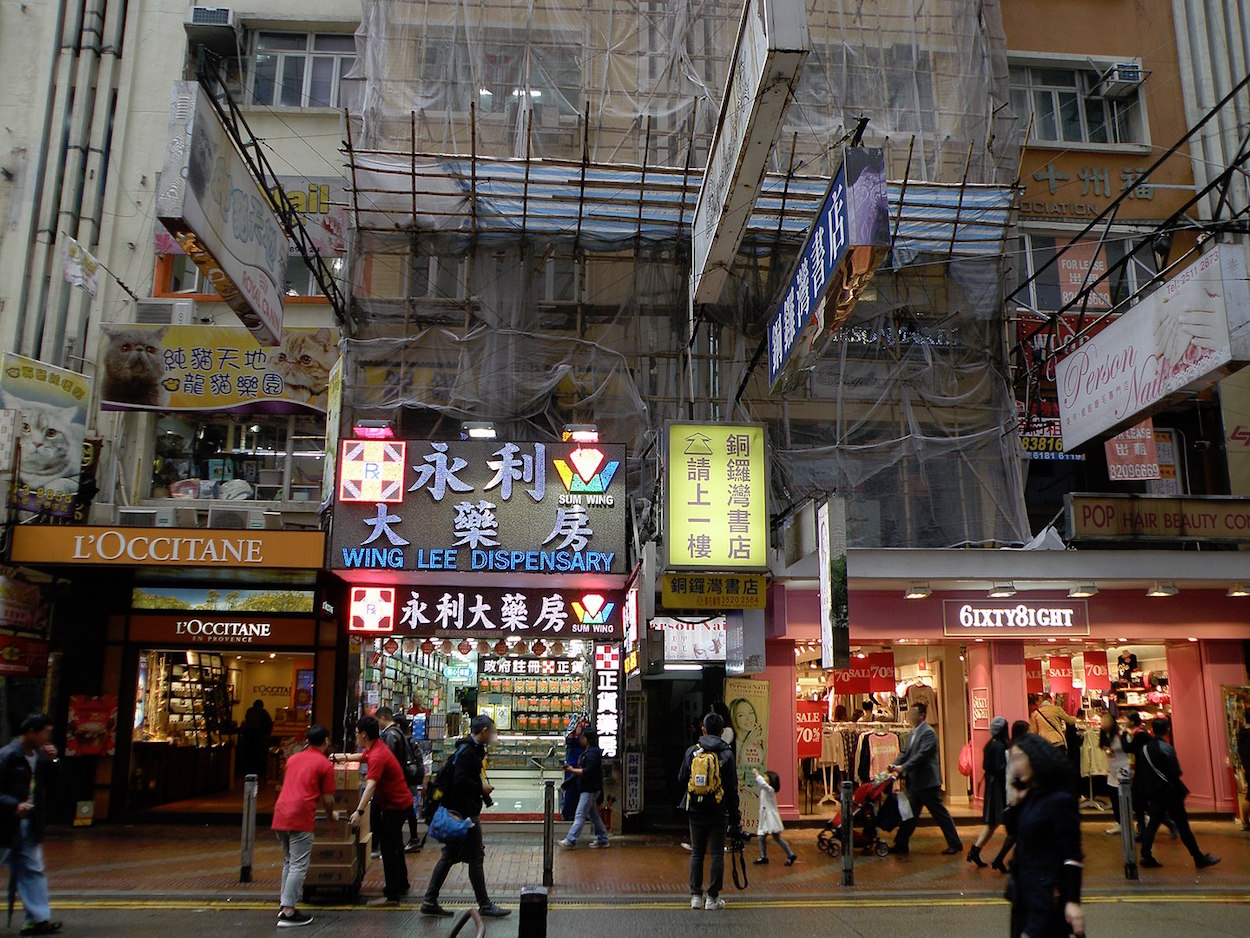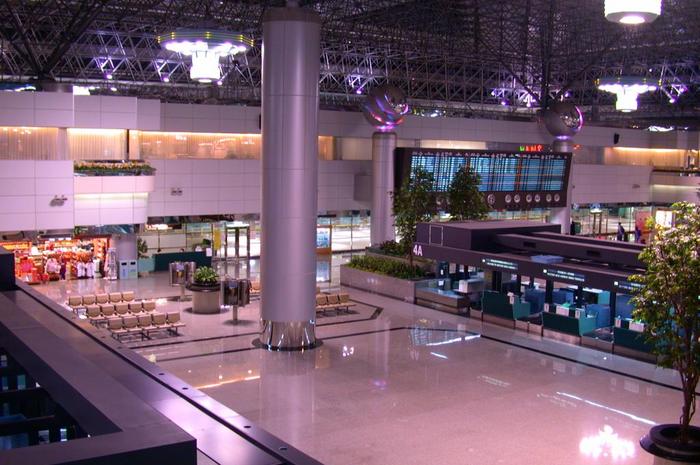by Brian Hioe
語言:
English
Photo Credit: 竹筍弟弟/WikiCommons/CC
CONCERNS REGARDING Chinese efforts to influence next year’s presidential elections have been flagged after a spying case involving a Chinese man claiming to be a spy seeking asylum in Australia exploded out into the open earlier this week.
26-year-old Wang Liqiang, also known by his English name of William, is currently seeking asylum in Australia. Wang claims to have been involved in the kidnapping of the Causeway Bay booksellers, spying efforts in Hong Kong, and efforts running an “Internet army” in Taiwan to influence the upcoming elections, claiming to have previously entered Taiwan with a fake South Korean passport and worked with pro-China organized crime groups. Wang is currently in Australia on a tourist visa with his wife, who is studying in Australia, and his young child.
 The former site of Causeway Bay Books. Photo credit: Exploringlife/WikiCommons/CC
The former site of Causeway Bay Books. Photo credit: Exploringlife/WikiCommons/CC
Wang claims to have been working with a company called China Innovation Investment Limited in Hong Kong and that a Chinese businessman he worked for, Xiang Xin, was at the center of a spy network. Wang further asserted that companies run by Xiang in Hong Kong had ties to the Chinese defense industry, in particular, the now-defunct COSTIND defense agency whose task was to modernize China’s defense capabilities and that Xiang’s wife, Kung Ching, an acting director at Xiang’s company, is also a spy. Companies run by Wang do, in fact, seem to be connected to COSTIND.
Strangely, not too long after these allegations by Wang exploded out into the open, Xiang and Kung were detained in Taoyuan International Airport. It is unclear why exactly Xiang and Kung would happen to be in Taiwan at the exact moment that news of Wang’s defection became widely reported on, but this has only added to the many questions about the case.
Many have taken a skeptical view to allegations by Wang, seeing some elements of Wang’s narrative do not seem to add up. Wang, for example, seems to have held an unusually senior position for a 26-year-old intelligence operative if he was in charge of high-level operations in both Hong Kong and Taiwan. Moreover, Wang does not seem to have the right background for intelligence work, seeing as he originally graduated with a degree in fine art and has no military or government background.
It is still unknown exactly what the details of any new information revealed by Wang are. It is already widely known that China sponsors disinformation efforts in Taiwan aimed at benefitting the KMT and other political proxy groups. It is already known that the Causeway Bay booksellers were in all likelihood kidnapped by the Chinese government. Likewise, Wang alleged that China Television, CtiTV, and Eastern Broadcasting accept money from the Chinese government in return for positive coverage. But one notes that the Apple Daily and the Financial Times previously reported on television networks and newspapers owned by the Want Want Group—which owns China Television and CtiTV—accepting Chinese funding.
 The departure hall of Taoyuan International Airport. Photo credit: PhiloVivero/WikiCommons/CC
The departure hall of Taoyuan International Airport. Photo credit: PhiloVivero/WikiCommons/CC
Chinese state-run media has attempted to cast doubt on Wang’s claims, stating that Wang has a previous criminal record and served jail for fraud in Shanghai. This is contradicted by the stamps present in Wang’s passport, which seem to show Wang was elsewhere the period that the Chinese government claims that Wang was in jail. Likewise, Chinese state-run media claims that Wang’s age indicates that he is too junior to hold the position he claims to hold—though rather bizarrely, Chinese state-run media also attempted to claim that Wang is too young to actually have a child.
The KMT has leveraged on the inconsistent aspects of Wang’s narrative with regards to Wang’s account of his background. The KMT has further accused the DPP of attempts to crack down on freedoms of speech with regards to claims that Taiwanese television networks are accepting Chinese funding.
This is unsurprising, given that the KMT stands to be negatively affected by the perception that it actively collaborates with the Chinese government. But regarding Wang’s inconsistent narrative, it is not impossible that, as with other political defectors, Wang has embellished his claims in order to strengthen his bid for asylum in Australia.
Disinformation efforts to spin the story may have already begun. Former Sunflower Movement student leader and DPP deputy secretary-general Lin Fei-fan took to Facebook yesterday to address rumors circulating on the Internet that Wang Liqiang was a relative of DPP legislator Wang Ting-yu and to point out that a photo purporting to show Wang Liqiang sitting at the same table with Hong Kong activists Joshua Wong, Eddie Chu, Nathan Law and former Tiananmen Square student leader Wang Dan shows another individual entirely, an assistant of former Hong Kong Legislative Council member Edward Yiu.
Reactions in Taiwan have led the DPP to call for the passing of a new anti-infiltration bill. The measures of this bill include measures against the disruption of public or social gatherings at the behest of foreign agents, attempts to initiate referendums or recall petitions at the behest of foreign agents, or making political donations using funding from foreign agents.
With regards to provisions against the disruption of public gatherings, the DPP is likely hoping to take measures against the possible use of violence by pro-China groups against political rallies in 2020 elections, as has occurred in the past with attacks on pro-independence demonstrations by pro-China organized crime groups. To this extent, as the KMT-aided recall campaign against Huang Kuo-chang for his support of gay marriage in 2017 and the results of last year’s election referendums go to show, the recall and referendum are easily abused electoral measures that stand to be highly affected by disinformation efforts.
Post by Lin Fei-fan regarding claims circulating online that Wang Liqiang is related to DPP legislator Wang Ting-yu and a picture claiming to show Wang with Lin, Joshua Wong, Wang Dan, and others
Media executives from China Television, CtiTV, and Eastern Television have been summoned for questioning by the National Communications Commission. One notes that there are usually stronger reactions from the Tsai administration whenever international media reports on Chinese disinformation efforts in Taiwanese media, while there tend to be weaker reactions when this is reported on by domestic media. The Tsai administration likely wishes to avoid the perception that it is politically targeting rival political camps and so likely is more restrained in action against Chinese disinformation efforts if only reported on by domestic media, without corroboration by international media.
However, it is generally unclear how these new measures would differ from existing measures against foreign interference, except by strengthening existing penalties. Pro-China Taiwanese media outlets appear to fine with continually incurring fines from the NCC regarding false news reports. Nor are pro-China organized crime groups in Taiwan likely to be substantially discouraged from attacks on critics of China by heavier penalties or increased jail time. And because the Tsai administration does, in fact, need to avoid the appearance of politically persecuting the KMT, the Tsai administration would in all probability be fairly restrained regarding efforts against political campaigns calling for recalls or referendums, even if they are in fact funded by China.

